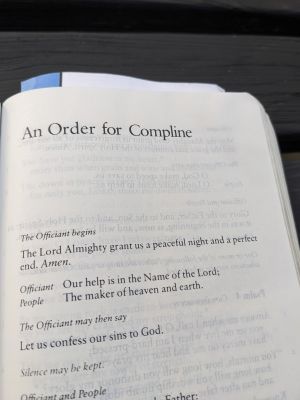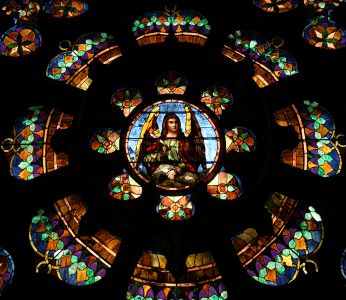I never did this until four months ago, but now, every night I pray, “Let your holy angels dwell with us to preserve us in peace,” and “Give your angels charge over those who sleep.” Unexpectedly, at the age of 72, angels have entered my devotional life.
I have always accepted angels as part of my belief. I thought about them in my youth, certainly after reading Out of the Silent Planet, by C. S. Lewis. I liked the idea of them, but they were essentially irrelevant to my experience of God. And that’s still true. I can’t tell if the angels respond to my prayers. I pray for them without understanding them.
I began to pray for angels when I took up the nightly Office of Compline, which includes those petitions. For thirty-five years I have prayed the daily Morning and Evening Offices and never prayed for angels. But now, with Compline, I am doing so, and I have to consider what I mean by the words I pray. (It is a gift of liturgical prayer that you pray beyond your understanding.)

I suspect that most Reformed Journal readers could admit that we treat angels as extras, even superfluous. We don’t deny them, but they’re effectively absent from our piety and functionally absent from our Reformed “world-and-life-view.” They won’t fit in our “square inches.” They are totally ignored by the Contemporary Testimony of the CRCNA, Our World Belongs to God, as well as the RCA’s Our Song of Hope. They’re not in the Heidelberg Catechism, the Canons of Dort, the Belhar Confession, the Nicene Creed, or the Apostles Creed. Only the Belgic Confession deals with them.
It’s probably thanks to the determinative influence of the Psalms that angels are not part of our devotion. The whole Psalter mentions them only nine times, and not once are they prayed for in the way the Compline does. The Psalter is remarkably direct in its devotional interaction between the soul and God. I call it remarkable because it was usual among the ancients to have hierarchical levels below the gods. But the Psalms are so starkly direct that they still work for modern believers: Here are we, and there is God, with no intermediate spirits involved in between.
Of course the Old Testament world was more complex than that, as Tom Boogaart has argued on these pages, and other Old Testament books have countless angels serving as messengers and agents and warriors. They are reported but not explained, nor systematized or regularized. They are also much in the New Testament, especially in Luke’s Gospel and The Revelation. Angels are a critical part of the “Kingdom of God,” although with all our talk about the Realm of God in “every sphere of life” we generally ignore this Biblical promise and mystery. (Hendrikus Berkhocf’s Christ and the Powers is a notable exception.) Our avoidance of all the ridiculous versions of angels out there is a poor excuse.
The great J. J. von Allmen wrote to the effect that the church needs to include the awareness of the presence of angels in its worship. By rights, we should acknowledge angels every time we celebrate Holy Communion. At the climax of the Communion Prayer we are supposed to join our voices with the angels and archangels in singing, “Holy, Holy, Holy, Lord God of Hosts.” But then we remove the angels when we translate “Hosts” (Sabaoth) as “Power and Might,” and that is a great loss. The word “hosts” suggests armies, which we feel as dangerous. “Hosts” is a challenge to our pious imaginations and to our domestication of Holy Communion.

For 19 years, I served the Old First Reformed Dutch Church of Brooklyn, New York, which has a magnificent sanctuary with great expanses of stained-glass windows. One of its rose windows is over the front doors, out of sight behind the congregation. But from the pulpit it is in full view. In the center of the rose is an angel, writing on a scroll. I imagined the words, “And to the angel of the church in Brooklyn, write,” and that the angel was there for me, the preacher. I never asked God to “give the angel charge of me,” but I would do so now.
Biblical angels can be distinct beings, like Gabriel, or apparently extensions of God’s self. So I don’t need to make a hard distinction between my specific prayers for the angels and my larger prayers for the Holy Spirit. That the Holy Spirit should offer the mystery and promise of angels at nighttime, when sleep deprives me of my agency, seems like a very Holy Spirit thing to do, and a lovely thing to pray for.


20 Responses
I love this. Thank you. I find the acknowledgement of angels in Compline very comforting and soothing as night falls.
Thanks for this thought-provoking piece. This will stay with me while I think more about angels now.
“It is a gift of liturgical prayer that you pray beyond your understanding.”
So very true. Loved this, Dan. It’s the gift of liturgy—to speak often of what we do not understand. And sometimes therefore speak it into being.
Thanks for writing this, Abuna. Your words give me pause to do some more thinking about angels.
Grateful for your wisdom and experience. I learned so much about angels from the many Roman Catholics in the congregation I served in upstate New York. Angels and archangels . . .
This essay helps make a little more sense of these lines from Leonard Cohen’s Marianne:
Well, you know that I love to live with you
But you make me forget so very much
I forget to pray for the angels
And then the angels forget to pray for us
Daniel, I grew up as a Catholic and went to Catholic elementary school and learned to highly regard angels. After many years of being CRC, I am recalling many of the things I was taught in the Catholic tradition. I just finish painting three portraits of angels. One is of Archangel Michael and the other two were of Gabriel. I sense the presence of their fluttering wings.
Many years ago I attended a funeral at a once-grand Catholic church in a Detroit neighborhood which, in the argot of the times, was described as “changing”. I overheard someone complaining to the priest about all the homeless people hanging about. He replied that he thought of them as angels, and went on to explain that angels are messengers from God, and these were messengers telling us something is very very wrong.
I’m a lifelong Presbyterian so angels were never much a part of my faith life, but I’ve never forgotten that explanation.
I love Bach’s musical depiction of the Seraphim in the Sanctus of the B Minor Mass.
For He shall give his angels a charge concerning thee, that they shall protect thee in all the ways thou goest, that their hands shall uphold and guide thee, lest thou dash thy foot against a stone.
Double quartet from the oratorio Elijah. It is a fabulous piece of music, and I am so glad that I was able to sing it so many years ago. The tune is going over and over in my head and I am taking comfort from the words.
Oh I do love that from Elijah
Thanks for this, Dan. I had not realized, until you point this out now, that angels are not mentioned in the Heidelberg Catechism, the Canons of Dort, the Belhar Confession, the Nicene Creed, nor in the Apostles Creed, and that only the Belgic Confession mentions them. Given the frequency of angels appearing in both Old and New Testaments, I find that shocking. As Janu Huissen quotes the Psalm, I’ve long believed that it’s not at all unlikely that we have a personal angel. I’ve often felt as if I do.
P.S. Jeff, whenever I enter the URL of my website, this submission does not recognize it, I’m not sure why not.
This may be that window in Dan’s church:
https://oldfirstbrooklyn.org/history/windows/#:~:text=Gazing%20at%20the%20stained%2Dglass,sure%20to%20keep%20you%20posted.
Yup. The first angel is in the Resurrection window. My angel is last one, in the Rose.
And you got to look at that every Sunday that you were preaching? What a gift.
Dan,
I’m curious; what source do you use for your morning and evening prayers? I have been using the Catholic prayer book for the last decade or so and have not found an alternative.
Steve
I use the Episcopal Book of Common Prayer, but in the edition called The Contemporary Office Book. With a few of my own modifications, evolved over the decades. I started praying the Daily Office with the Roman version, which I learned from the Carmelites early in the 1990s, and I even had the Four Volume edition of Christian Prayer, but I did not like the constant interruption of the saints, or the New American Version of the Bible, so in like 1997 I switched to the BCP.
The app The Daily Office is convenient and easy to use. I have it for iPhone, and it’s probably also available for other platforms.
Interesting title for this piece, one that can be interpreted in more than one way — praying for (on behalf of) angels, or praying for angels (to be active in our lives)……
I love thinking about angels. Weird, maybe, as a scientist. But I do. Thank you for this. I need to add them to my prayers.